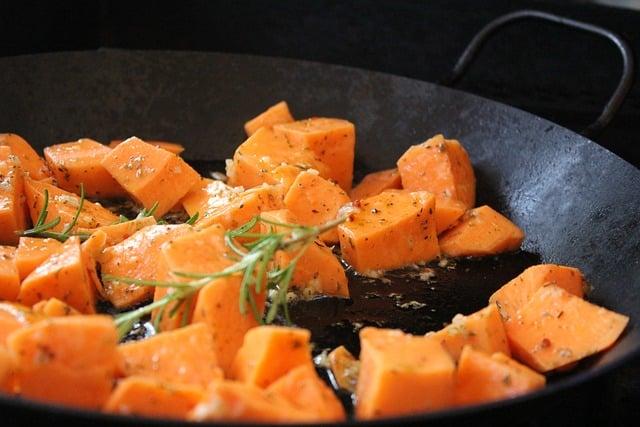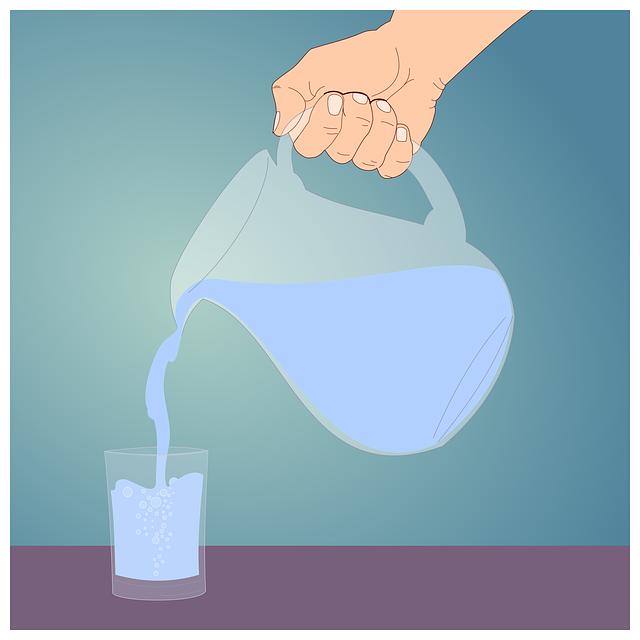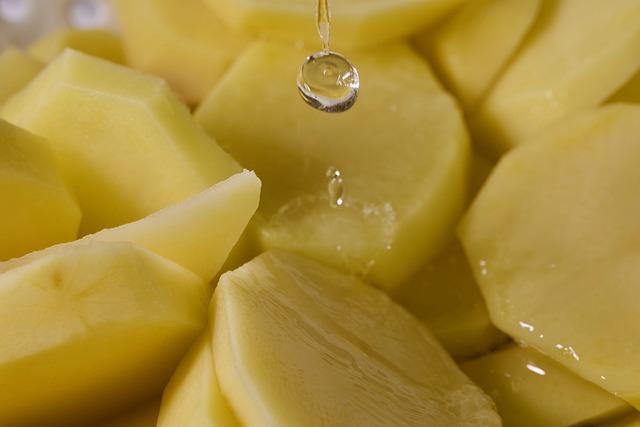Starchy Hydration: Is Potato Water Good for You?
Hey there, potato lovers! Have you ever wondered if there’s more to that cloudy water left over after boiling your spuds? In this article, we’re diving into the world of starchy hydration and exploring whether potato water is actually good for you. Get ready to sip on some surprising facts!
Contents
- Introduction: Unveiling the Benefits of Potato Water Post Cooking
- Nutrient Content: Exploring the Vitamin and Mineral Richness in Potato Water
- Hydration Power: How Potato Water Can Keep You Hydrated and Healthy
- Weight Management: Understanding the Role of Potato Water in Weight Loss
- Digestive Health: How Potato Water Can Aid Digestion and Gut Health
- Skin Benefits: The Surprising Ways Potato Water Can Boost Skin Health
- Recommended Intake: How Much Potato Water Should You Drink Daily?
- Conclusion: Embracing Potato Water as a Nutritious Hydration Option
- In Conclusion
Introduction: Unveiling the Benefits of Potato Water Post Cooking
Potato water, the often overlooked byproduct of boiling potatoes, holds a treasure trove of benefits that many are unaware of. Yes, that starchy hydration left in the pot after cooking your spuds can actually be good for you! So before you toss it down the drain, let’s delve into the reasons why you might want to consider incorporating potato water into your diet.
One of the key benefits of potato water is its high nutrient content. When potatoes are cooked in water, they release a variety of vitamins and minerals that end up in the liquid. These include potassium, vitamin C, and B-vitamins, which are essential for overall health. Additionally, potato water contains resistant starch, a type of starch that acts as a prebiotic and promotes gut health.
Furthermore, potato water can be a versatile ingredient in the kitchen. It can be used as a base for soups, stews, or sauces to add flavor and nutrients. You can even use it as a natural thickener for gravies or as a substitute for stock in vegetarian dishes. So next time you cook potatoes, consider saving that liquid gold and reaping the benefits of potato water post cooking.
Nutrient Content: Exploring the Vitamin and Mineral Richness in Potato Water
Potato water, the often overlooked byproduct of boiling potatoes, actually holds a treasure trove of essential nutrients that can benefit your health in numerous ways. This starchy hydration is not just good for your plants – it’s good for you too! Here’s a closer look at the impressive array of vitamins and minerals found in potato water:
- Vitamin C: Potato water is a surprisingly rich source of vitamin C, an important antioxidant that supports immune function and skin health.
- Potassium: This essential mineral helps regulate blood pressure, muscle contractions, and nerve function. And guess what? Potato water is packed with potassium!
- B Vitamins: Potato water contains a range of B vitamins, including B6 and niacin, which play a crucial role in energy production and brain function.
Incorporating potato water into your diet can be a simple and cost-effective way to boost your nutrient intake and reap the health benefits that these vitamins and minerals offer. So next time you’re boiling potatoes, don’t pour that nutrient-rich liquid down the drain – save it and savor the goodness hidden within!
Hydration Power: How Potato Water Can Keep You Hydrated and Healthy
Potato water, the liquid leftover from boiling potatoes, may not seem like the most glamorous beverage. However, don’t underestimate its hydration power. This starchy liquid is packed with nutrients and can help keep you hydrated and healthy.
Here are some reasons why potato water can be beneficial for your overall wellness:
- Nutrient-rich: Potato water contains important vitamins and minerals, such as vitamin C, potassium, and magnesium, which can help support your overall health.
- Hydrating properties: The starchy water from boiling potatoes is a great way to keep yourself hydrated, especially during hot summer days or after a workout.
- Digestive aid: Potato water is known for its soothing properties that can help with digestion and may even relieve bloating or indigestion.

Weight Management: Understanding the Role of Potato Water in Weight Loss
Potato water, often dismissed as a byproduct of boiling potatoes, actually holds a lot of hidden potential when it comes to weight management. This starchy liquid is packed with essential nutrients and can be a helpful aid in your weight loss journey. Here’s why you should consider incorporating potato water into your daily routine:
- Hydration: Potato water is a great source of hydration, as it contains important vitamins and minerals that can help keep you feeling full and satisfied throughout the day.
- Nutrient-rich: Potato water is filled with nutrients such as potassium, vitamin C, and B-vitamins, which are essential for overall health and well-being.
- Low in calories: Potato water is a low-calorie option that can help you stay on track with your weight loss goals without sacrificing taste or nutrition.
Next time you boil potatoes, don’t pour the water down the drain – instead, consider drinking it or using it in recipes for a healthy boost that could make a difference in your weight management journey.

Digestive Health: How Potato Water Can Aid Digestion and Gut Health
Potato water, the liquid leftover from boiling potatoes, may seem like a humble kitchen byproduct, but its benefits for digestive health are nothing short of remarkable. This starchy hydration contains a host of nutrients and compounds that can aid digestion and improve gut health. Here are some reasons why potato water is a superfood for your digestive system:
- Rich in resistant starch: Potato water is a great source of resistant starch, a type of fiber that resists digestion in the small intestine and reaches the colon intact. This promotes the growth of beneficial bacteria in the gut, leading to better digestion and overall gut health.
- Helps with bloating and constipation: The high water content of potato water can help hydrate the digestive tract and alleviate bloating. Additionally, the resistant starch in potato water can improve bowel regularity and relieve constipation.
- Supports a healthy microbiome: The nutrients in potato water nourish the good bacteria in your gut, helping to maintain a balanced microbiome. A healthy gut flora is essential for optimal digestion, nutrient absorption, and overall wellness.
Incorporating potato water into your diet can be a simple yet effective way to support your digestive health. Whether you drink it as a refreshing beverage or use it in soups and stews, this underrated liquid has a lot to offer when it comes to keeping your gut happy and healthy.
Skin Benefits: The Surprising Ways Potato Water Can Boost Skin Health
Potato water, the liquid left over after boiling potatoes, may seem like just a byproduct of cooking. However, this starchy hydration can actually work wonders for your skin health.
One surprising benefit of potato water is its ability to hydrate and nourish the skin. This natural remedy is rich in vitamins and minerals that can help keep your skin moisturized and glowing. Additionally, the starch in potato water can act as a gentle exfoliant, removing dead skin cells and leaving your complexion smoother and brighter.
Potato water can also help soothe irritated skin and reduce inflammation. The antioxidants in potatoes can help combat free radicals and protect the skin from damage. Whether used as a toner, a face mask ingredient, or simply splashed onto the skin, potato water can be a versatile addition to your skincare routine.
Recommended Intake: How Much Potato Water Should You Drink Daily?
Potato water, the starchy liquid left over from boiling potatoes, has gained popularity in recent years for its potential health benefits. Many believe that drinking potato water can help with digestion, hydration, and even weight loss. But how much potato water should you be drinking daily to reap these benefits?
The recommended intake of potato water can vary depending on your individual needs and preferences. Some experts suggest starting with small amounts, such as a few tablespoons a day, and gradually increasing to up to 1-2 cups a day. It’s important to listen to your body and adjust your intake accordingly.
Keep in mind that while potato water can be a healthy addition to your diet, it should not be used as a replacement for plain water or other hydrating beverages. It’s always best to consult with a healthcare professional or nutritionist to determine the right amount of potato water for you based on your unique health goals and dietary needs.
Conclusion: Embracing Potato Water as a Nutritious Hydration Option
After exploring the various benefits of potato water, it is clear that this starchy hydration option can be a nutritious choice for staying hydrated. With its rich array of vitamins and minerals, potato water offers a unique blend of nutrients that can support overall health and well-being. By incorporating potato water into your hydration routine, you can enjoy a refreshing beverage that not only quenches your thirst but also provides essential nutrients for your body.
As a cost-effective and sustainable alternative to other hydration options, potato water is a versatile ingredient that can be used in a variety of recipes. Whether you use it in soups, smoothies, or simply enjoy it on its own, potato water can be a delicious and nourishing addition to your diet. By embracing potato water as a nutritious hydration option, you can reap the benefits of this underrated ingredient and support your overall health.
In Conclusion
In conclusion, potato water may not be a miracle elixir, but it certainly has its benefits when it comes to hydration. With its high starch content and essential nutrients, it can be a valuable addition to your diet. Whether you’re looking to improve your digestion, boost your energy, or simply stay hydrated, incorporating potato water into your daily routine can be a simple and effective way to support your overall health. So next time you’re boiling potatoes, don’t pour that water down the drain – savor it instead! Cheers to starchy hydration! Thank you for reading and stay tuned for more enlightening articles.







